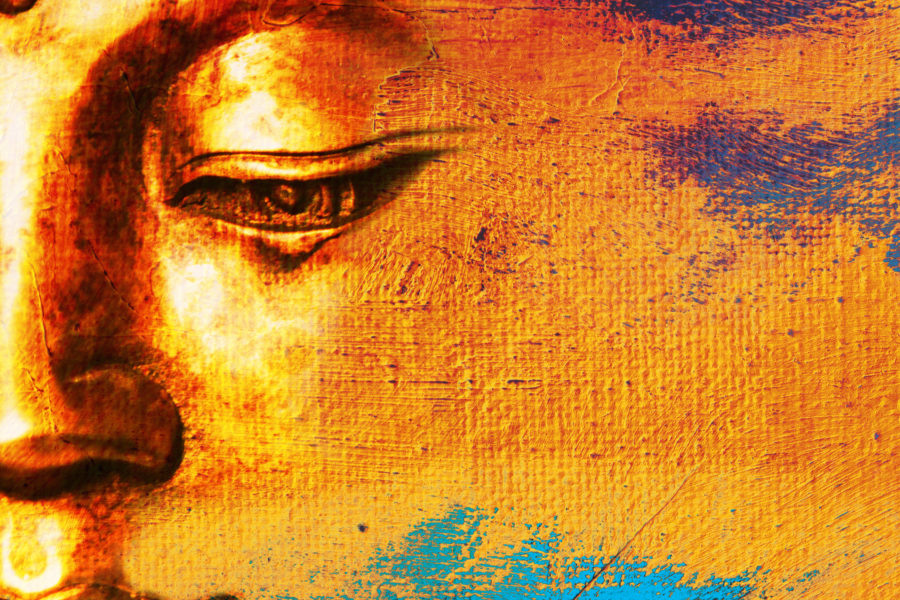There is a difference between the fear of judgement and the practice of non-judgment.
By Mandy Peterson
People worry too much about who is judging who, who is judging me, and who am I judging. First of all, if you can fully love and accept yourself, then you never have to worry about what others think. Second, it’s hard to talk about being against judgment without judging the act of judging. Thirdly, asking for good judgments (wanting approval from people) invites ego, invites others opinions, and, thus, invites both the positive and negative dualities. ~Anonymous
The difference between the two is easy to recognize within the world. In fact, those who feel they need to instruct others on how they should “not judge others” are usually practicing the fear of judgment rather than the practice of non-judgment. What they may feel sensitive toward is negative criticism. They are usually types who try not to hurt others or to be too critical because they are empathic toward the pain that certain words and labels can cause; harboring such pain within themselves.
If you notice the statements they tend to make, the focus is usually upon “the others” and whether “others” are being negatively critical. Another problem in such teachings can lie with feeding the illusion that we need to feel dependent upon love and approval from others in order to love and approve of ourselves. In such cases, even constructive criticism can be avoided because it may be perceived as painful to the ego or as something which causes the question to arise; “am I good enough?” Usually, such an approach results in the suppression of thoughts and feelings out of a desire to be “good” or non-judgmental toward others. It simultaneously expects others to be shut down this way, as well.
This said, it is only natural that those who are fearful of criticism would idealize living in a more loving world where everyone suspended their negative criticism. Though this seems a beautiful ideal, I have a hard time believing that the world can become enlightened through suspending all judgment. After all, judgment and responsibility are inherent within our concepts of Karma and the Law of Attraction. Whether we show “good judgment” or “bad judgment,” we reap what we sow; i.e. we become judged by the creations we manifest and have the opportunity to take responsibility for them. So, if we were to suspend all of our ability to look at others and the world in a critical way, we would lack the ability to grow or to learn from the karma we create.
Another problem lies with how the word becomes used. It seems to conjure up fear when defined in purely negative terms. This is why I have replaced it with the word “criticism;” since it is not really an issue with “judgment” (which can be favorable or less favorable). It does not even appear to be an issue with condemnation, but with the fear of hurting others through words or through forming an opinion in any critical way. Which, where the line becomes drawn between the negative and positive becomes blurry; for example, judging someone as “thrifty” could be taken as praise or criticism depending upon the mind-set of the person such a judgment was intended toward.
Here is the definition of the word judgment according to the free online dictionary:
judg·ment also judge·ment (jŭj′mənt)
n.
- The act or process of judging; the formation of an opinion after consideration or deliberation.
- a. The mental ability to perceive and distinguish relationships; discernment: Fatigue may affect a pilot’s judgment of distances. b. The capacity to form an opinion by distinguishing and evaluating: His judgment of fine music is impeccable. c. The capacity to assess situations or circumstances and draw sound conclusions; good sense: She showed good judgment in saving her money. See Synonyms: reason.
- An opinion or estimate formed after consideration or deliberation, especially a formal or authoritative decision: awaited the judgment of the umpire.
- Law a. A determination of a court of law; a judicial decision. b. A court act creating or affirming an obligation, such as a debt. c. A writ in witness of such an act.
- An assertion of something believed.
- A misfortune believed to be sent by God as punishment for sin.
- Judgment The Last Judgment.
Nowhere in this definition does it state that judgement only applies to negative criticism. In fact, the mystical approach to non-judgement, as focused on by many masters and mystics, focuses upon the activities of the mind in general, both positive and negative. For, our mind and ego is always judging things in dualistic ways (positive and negative). In order to pursue pleasure or to avoid pain we must make judgments about both. In the eyes of the mystics, however, both pleasure and pain are illusion and even the pursuance of pleasure can lead to suffering.
In the The Alpha and the Omega, Vol. 10 (1978), Osho is quoted as stating:
So pleasure seems to be a trick of desire: to trick you into pain. First the painful will drop, and then you will be able to see that the pleasure is illusory, unreal, a dream. 99.9 percent of desires will disappear through understanding, and then the final happens. It happens simultaneously: 100 percent of desires disappear, and the original mind arises in a single moment, not as cause and effect, but simultaneous, together.
Another misconception is that in order to be spiritually enlightened, we must see everything in a “positive” way and deny the “negative.” This, however, would turn most masters into hypocrites if it were true.
Most mystics taught from a place of recognizing dualities in order to transcend them. This didn’t mean they did not see “negatives.” To not see the negative or the suffering within something would mean not seeing anything to transcend. After all, how can the mystic transcend duality and the suffering created by his mind if he first cannot recognize that it is the mind that is bringing upon him suffering? The recognition of what aspects of mind create suffering inspires the desire to transcend these aspects of the mind.
Gautama Buddha, like many other masters, was constructively critical of mankind within his written works. This did not mean that he did not recognize that, at the spiritual level, all these facets of mankind were not illusion. In the Dhammapada, Gautama Buddha openly discusses the effects that happen when Mara (the equivalent of the devil) has control of the mind. He likewise discussed at length the effects of man’s greed and “wickedness,” etc. He never suggested that once enlightened you will stop noticing all those things. In fact, of those who become enlightened, Gautama Buddha states:
Just as one upon the summit of a mountain beholds the groundlings, even so when the wise man casts away heedlessness by heedfulness and ascends the high tower of wisdom, this sorrowless sage beholds the sorrowing and foolish multitude. (Dhp II – 28)
The reason that the mystical approach to non-judgment can recognize dualities is because it is less idealistic or split, As Osho states;
The schizophrenia has to be dropped in a deep understanding. Don’t fight with yourself. And always remember that the top-dog is wrong. Always remember that the natural is truer. Wherever there is conflict, follow the natural. ~ OSHO, Nirvana: The Last Nightmare, Ch #1: Mastered by Zen
Thus, those who instruct in how to reach a place of mystical “non-judgement” often preach the allowance of all things. In the allowance of all things, there is an allowance of other people’s thoughts, emotions, criticism, impressions, foolishness, etc. In this allowance, it doesn’t mean you can never express anything either. That is part of what is also allowed. Thus, non-judgement does not come from attempting to shut down the emotions, feelings, or thoughts within the self or others. It comes from increasing understanding and lucidity within the dream of life; recognizing all that we judge as good or bad is, in the end, illusion.
So, if we aren’t supposed to shut our negative thoughts and emotions down, what are we supposed to do with them?
There is a difference between suppression of thoughts/emotions and “mindfulness.” In fact, mindfulness is the opposite of suppression. As the term implies, it is being “mindful:” i.e. paying attention. The mystic or monk does not transcend his thinking by force. Instead, becoming mindful is a process of watching the thoughts moving through our minds while stepping back enough to recognize them as stories and illusions. As Eckhart states:
The ego isn’t wrong; it’s just unconscious. When you observe the ego in yourself, you are beginning to go beyond it. Don’t take the ego too seriously. When you detect egoic behavior in yourself, smile. At times you may even laugh. How could humanity have been taken in by this for so long?
So, again, the practice of non-judgment does not mean we deny our experiences or what we have manifested. Such “fruits” (as the mystics call them) can be used to help us to break through our illusions in order to find truth. For example, if we use what we clearly see of what humanity creates of our environmental situation, we can use that to become more mindful and lucid concerning the illusions that we buy into and which manifest a state of suffering. We can make a clear and detached judgment of “I see here that mankind, through certain patterns of greed and action, is creating suffering,” without condemning the spirit within mankind as unworthy of God’s love and compassion. This is a better alternative to employing denial. For, when we live in denial, trying never to see anything negative, we shut down our ability to be mindful. Thus, we may keep churning out unconscious thoughts, dreams and scenarios (including striving after what we feel is positive and seeing only what we want to see) which prolong our suffering or delay our enlightenment. We end up manifesting a form of tunnel vision which blocks a bigger perspective and view. Not that this is right or wrong, either. It is simply a choice we make. as part of living in a dimension where we all can experience and learn from our free will choices.
Little by little, if we can become mindful of a bigger picture and can employ good judgment toward it, we can begin to see how much of what we make important or defining to us is fear-based or illusion. This includes things that we take for granted every day; such as our attachment to all forms; all conditions; all brainwashing; all ideas of money, culture, need, definitions (success/failure); etc. But, before you feel overwhelmed by the thought of having to release all of these things, remember that Buddha did teach there was a middle way between extremes.
Want to learn more?
OSHO and Eckhart Tolle are wonderful teachers on these subjects. A Course in Miracles teaches many of these principles of releasing the illusions of the world as well.
About the Author:
 Mandy Peterson is a psychic visionary, empath and EFT practitioner. She is the author of “I Am the Lotus, Not the Muddy Pond: Achieving Peace Through Non-Conformity,” and “A Guest In Their Universe.” An artist and graphic designer, Mandy has also created and designed an EFT Divination Kit to compliment the use of EFT muscle testing, and a Healers of the Earth Oracle tarot deck.
Mandy Peterson is a psychic visionary, empath and EFT practitioner. She is the author of “I Am the Lotus, Not the Muddy Pond: Achieving Peace Through Non-Conformity,” and “A Guest In Their Universe.” An artist and graphic designer, Mandy has also created and designed an EFT Divination Kit to compliment the use of EFT muscle testing, and a Healers of the Earth Oracle tarot deck.
Learn more about Mandy here: https://mysticmandy.com/






